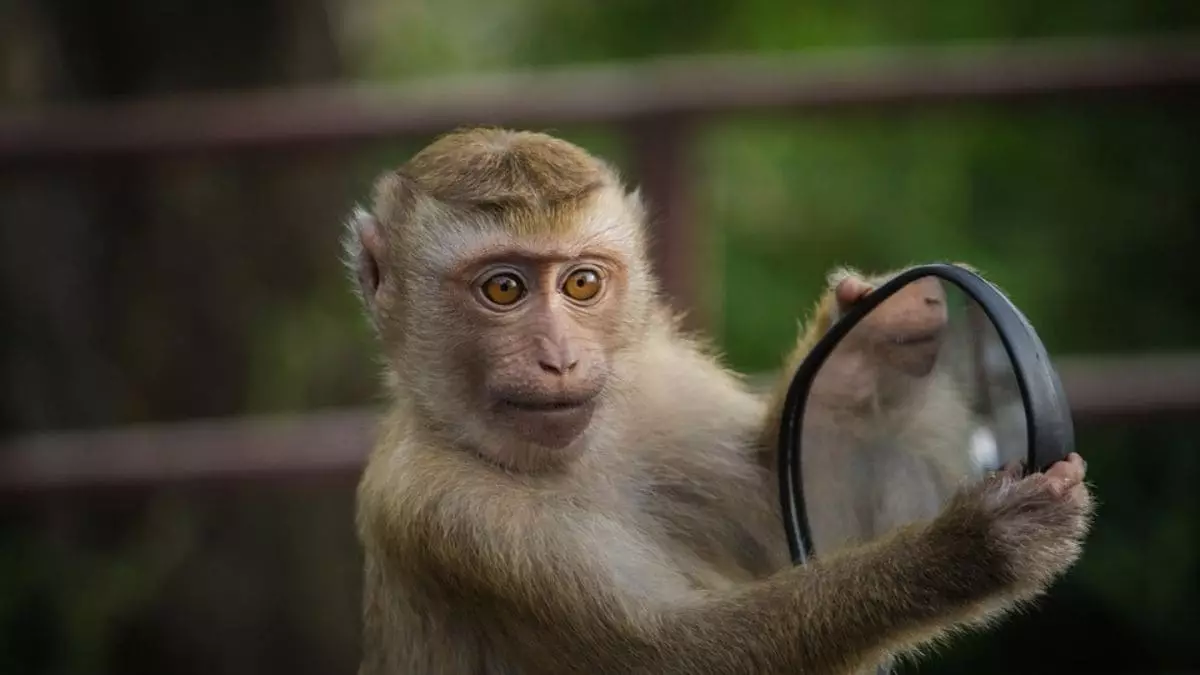Understanding the cognitive capabilities of non-human animals has been a subject of great interest within the fields of biology and psychology. A recent study focusing on chacma baboons (Papio ursinus) has shed light on the intriguing question of self-awareness in primates. Conducted over five months in Namibia’s Tsaobis Nature Park, this research revealed that these animals do not recognize themselves in mirrors, thereby prompting broader discussions regarding the nature of self-awareness in the animal kingdom.
In the study, researchers installed large mirrors near common watering holes used by two baboon troops. The aim was to determine whether the baboons would connect their reflection with their physical selves. To gauge their responses, researchers projected a laser dot onto the baboons’ faces and other parts of their bodies. While a significant number of baboons (64%) reacted to the laser on their arms or legs by touching the dots, only one out of 51 baboons acknowledged the laser when it marked their facial area. This stark contrast raises questions about the cognitive processes at play: when faced with the reflection in a mirror, the baboons exhibited interest but decidedly did not connect this interest with self-recognition.
Challenging Established Concepts of Self-Awareness
The results of this study challenge previously held beliefs regarding self-awareness among primates. While species such as chimpanzees, dolphins, and some fish have demonstrated the ability to acknowledge their reflection, the chacma baboons appear to fall outside this category. Primatologist James Anderson emphasized that the observations align with existing literature indicating that non-ape primates generally do not demonstrate self-recognition through mirrors, a trait sometimes utilized as a benchmark for self-awareness.
The lack of response from the baboons when a laser dot was projected onto their faces suggests a potential disconnect between their perception of the mirror and their self-identity. Masanori Kohda, an animal sociologist, raised an intriguing hypothesis: the baboons may interpret the static laser dot not as a manifestation on their faces but rather as an external mark on the mirror itself. This revelation implies that the cognitive process of recognizing oneself in a reflection is far more complex than previously understood.
The concept of self-awareness is often viewed dichotomously; however, behavioral psychologist Lindsay Murray posits that it exists on a continuum. Her point is particularly relevant when considering the results of the baboon study. Even among humans, only a portion of young children can pass the mirror test by the age of two, indicating that self-awareness is developed over time and varies across species. The baboons in question, thriving in their natural habitats, may not require self-recognition to navigate their environment successfully.
This leads to a compelling argument by Alecia Carter, an evolutionary anthropologist, who suggests that the ability to recognize one’s own reflection might not hold evolutionary significance for baboons. In a world where survival hinges more on social skills and environmental awareness than on self-reflective capacity, the findings compel us to reconsider how we define self-awareness across different animal species.
Expanding the Scope of Animal Cognition Research
The differences observed in the baboon study reflect a wider debate in animal cognition research. As scientists probe deeper into the minds of various species, it becomes evident that traditional measures of self-awareness, such as the mirror test, might not encapsulate the multifaceted nature of cognitive abilities across the animal kingdom. Each species has evolved unique traits tailored to its ecological niche, suggesting a broader understanding is essential.
While the findings from this study may indicate a lack of self-recognition in chacma baboons, they prompt a larger discussion about how we interpret and assess cognitive abilities in animals. Rather than dismissing non-human primates as incapable of self-awareness, it may be more fruitful to appreciate the diversity of cognitive processes that exist in different species. This understanding opens up avenues for future research, emphasizing the need for nuanced approaches to studying animal behavior and cognition.


Leave a Reply